La Brière (Léon Poirier, 1924) was a French rural film drama, based on a 1923 novel by Alphonse de Chateaubriant which had won the Prix Goncourt. The very atmospheric film, produced by the Compagnie Universelle Cinématographique, was shot in March-April 1924, partly at the Gaumont studios in Paris, partly on location at the fenscape at St. Joachim, Brière, a region west of Nantes, in French Brittany.
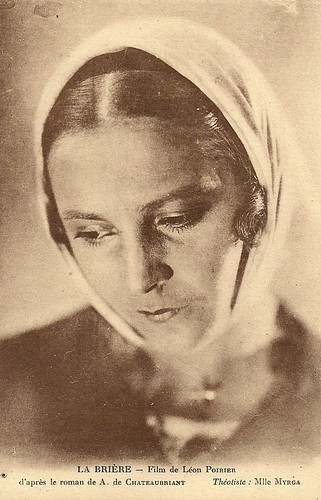
French postcard. Caption: Laurence Myrga as Théotiste.
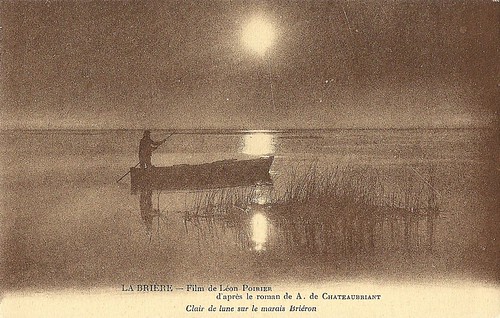
French postcard. Caption: Moonlight over the Breton marsh.
The story of the silent film La Brière/Passion and Peat (Léon Poirier, 1924) deals with the rough and unpolished men and women who inhabit the region of La Brière and live on peat cutting, when peat is running out.
A fierce argument breaks out about the draining of the marshes in service of the manufacture of bricks. An old stubborn man, Aoustin (José Davert), leads the resistance to the drainage project and refuses to give his daughter Théotiste (Laurence Myrga) to a young peasant, Jeanin (Armand Tallier), who is in favour of the draining.
When a pregnant Théotiste is still refused marriage and Aoustin even wants to have Jeanin arrested for poaching, the latter shoots Aoustin's hand off.
Théotiste has a miscarriage and is accused of killing her child, after which Jeanin and the whole community shun her.
Aoustin gets a wooden hand. He wants to kill Jeanin, but first needs to bring Théotiste to a hospital through the marshes. He gets lost in the freezing cold while his daughter dies. In the end, Aoustin lets Jeanin go.
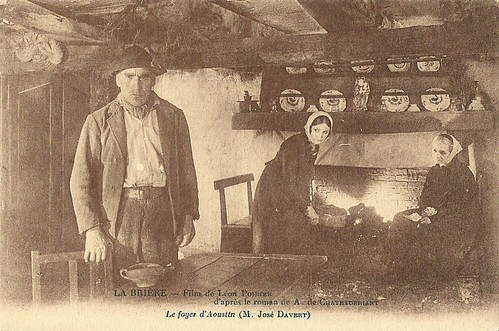
French postcard. Caption: The home of Aoustin (José Davert). In the back his wife (Jeanne Marie-Laurent) and daughter Théotiste (Laurence Myrga).
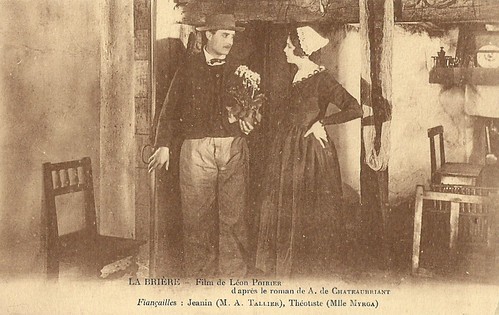
French postcard. Caption: Betrothal. Jeannin (Armand Tallier) and Théotiste (Laurence Myrga).
La Brière premiered on 23 April 1925 and despite its independent production, it was commercially launched by an exclusive month-long run at the Paris Madeleine-Cinéma. It was very successful. The atmospheric cinematography of La Brière was done by Lucien Bellavoine, and the sets were designed by Robert-Jules Garnier. Paul Ladmirault from Nantes composed a special score for the silent film.
La Brière was the breakthrough of José Davert, a hitherto quite unknown actor, who would act in several films of Poirier afterwards, such as Verdun, vision d'histoire (1928). In addition to Davert, Laurence Myrga and Armand Tallier, Jeanne Marie-Laurent plays Aoustine, the mother.
Richard Abel writes in his study French Cinema. The First Wave, 1915-1929: “By 1924, the realist provincial film reached a kind of apotheosis in two large-scale productions which combined the French love for the ambience of river or canal landscapes with their interest in the culture of Brittany.”
La Brière was one of the two. Abel: “For the most part, La Brière’s rhythm is slow, magisterial, in correspondence with the calm, flat landscape of the salt marsh and the lives of its rustic inhabitants. With his large solid physique and expressionless weathered face, Aoustin becomes an icon of the people’s determined resistance to change.”
Abel: "The socioeconomic conflict is displaced almost completely into the family, where it is resolved tragically in a romantic, moralistic plot that turns the old man’s rebellious vision into a form of blindness. Théotiste bears a dead child illegitimately; Aoustin loses a hand that is replaced by a wooden one; the salt marsh turns into bricks – all because a daughter won’t obey her father.”
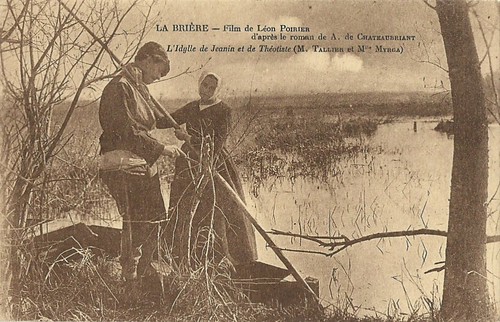
French postcard. The idyll between Jeannin (Armand Tallier) and Théotiste (Laurence Myrga).
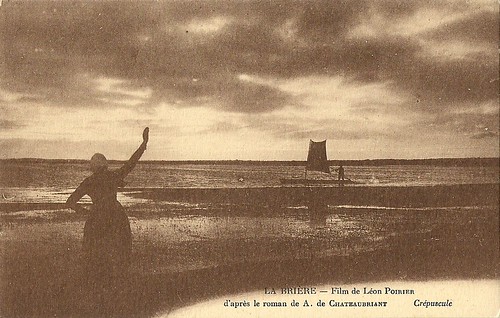
French postcard. Caption: Twilight.
Sources: Richard Abel (French Cinema. The First Wave, 1915-1929), Cinematheque Bretagne (French), Wikipedia, and IMDb.
This post was last updated on 30 November 2023.

French postcard. Caption: Laurence Myrga as Théotiste.

French postcard. Caption: Moonlight over the Breton marsh.
Rough and unpolished
The story of the silent film La Brière/Passion and Peat (Léon Poirier, 1924) deals with the rough and unpolished men and women who inhabit the region of La Brière and live on peat cutting, when peat is running out.
A fierce argument breaks out about the draining of the marshes in service of the manufacture of bricks. An old stubborn man, Aoustin (José Davert), leads the resistance to the drainage project and refuses to give his daughter Théotiste (Laurence Myrga) to a young peasant, Jeanin (Armand Tallier), who is in favour of the draining.
When a pregnant Théotiste is still refused marriage and Aoustin even wants to have Jeanin arrested for poaching, the latter shoots Aoustin's hand off.
Théotiste has a miscarriage and is accused of killing her child, after which Jeanin and the whole community shun her.
Aoustin gets a wooden hand. He wants to kill Jeanin, but first needs to bring Théotiste to a hospital through the marshes. He gets lost in the freezing cold while his daughter dies. In the end, Aoustin lets Jeanin go.

French postcard. Caption: The home of Aoustin (José Davert). In the back his wife (Jeanne Marie-Laurent) and daughter Théotiste (Laurence Myrga).

French postcard. Caption: Betrothal. Jeannin (Armand Tallier) and Théotiste (Laurence Myrga).
All because a daughter won’t obey her father
La Brière premiered on 23 April 1925 and despite its independent production, it was commercially launched by an exclusive month-long run at the Paris Madeleine-Cinéma. It was very successful. The atmospheric cinematography of La Brière was done by Lucien Bellavoine, and the sets were designed by Robert-Jules Garnier. Paul Ladmirault from Nantes composed a special score for the silent film.
La Brière was the breakthrough of José Davert, a hitherto quite unknown actor, who would act in several films of Poirier afterwards, such as Verdun, vision d'histoire (1928). In addition to Davert, Laurence Myrga and Armand Tallier, Jeanne Marie-Laurent plays Aoustine, the mother.
Richard Abel writes in his study French Cinema. The First Wave, 1915-1929: “By 1924, the realist provincial film reached a kind of apotheosis in two large-scale productions which combined the French love for the ambience of river or canal landscapes with their interest in the culture of Brittany.”
La Brière was one of the two. Abel: “For the most part, La Brière’s rhythm is slow, magisterial, in correspondence with the calm, flat landscape of the salt marsh and the lives of its rustic inhabitants. With his large solid physique and expressionless weathered face, Aoustin becomes an icon of the people’s determined resistance to change.”
Abel: "The socioeconomic conflict is displaced almost completely into the family, where it is resolved tragically in a romantic, moralistic plot that turns the old man’s rebellious vision into a form of blindness. Théotiste bears a dead child illegitimately; Aoustin loses a hand that is replaced by a wooden one; the salt marsh turns into bricks – all because a daughter won’t obey her father.”

French postcard. The idyll between Jeannin (Armand Tallier) and Théotiste (Laurence Myrga).

French postcard. Caption: Twilight.
Sources: Richard Abel (French Cinema. The First Wave, 1915-1929), Cinematheque Bretagne (French), Wikipedia, and IMDb.
This post was last updated on 30 November 2023.
No comments:
Post a Comment